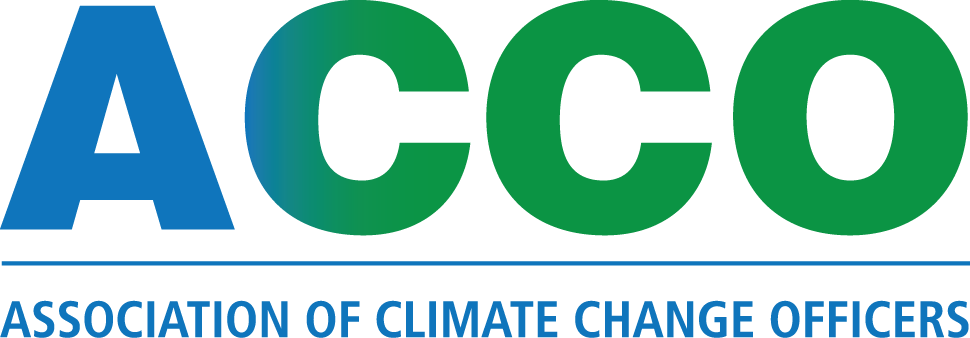About the CC-P® Candidate Exams
Effective May 15, 2024, ACCO has updated the process to earn the CC-P® Candidate designation.
This revised process reflects alignment with the updated CC-P® Curriculum (v.2) and corresponding exam questions.
About the CC-P® Candidate Entrance Exams
You are not required to take any courses in advance of these exams, though ACCO has listed recommended prep materials for each exam module. The following information provides a short description, focal points and recommended prep materials for each exam module. In order to earn the CC-P Candidate designation, enrolled participants must score a 70% or higher on each of the following 3 exams.
Exam #1
Assesses your understanding of climate science, climate impacts on human and natural systems, and capacity to conduct vulnerability assessments and inform organizational or regional decision making with critical resources.
Weather, climate variability, and climate change
Recent decadal-scale changes in climate and their impacts
Climate forcings and feedbacks, their relative importance and certainty
Scientific basis for projections of ongoing climate change; major impacts and corresponding certainty
Scientific studies on public opinion; communication about climate science to diverse audiences
The diverse elements of climate impacts and their projected consequences for human and natural systems
Intersections and synergies possible from climate impacts among natural systems and between changing natural systems and human systems
Identifying climate-related hazards
Vulnerability and risk
Data, tools, and technology to perform a vulnerability assessment
Process for conducting a vulnerability assessment
Recommended prep materials:
Climate-101, Climate-105 & Climate-201
Estimated prep time:
8 hours
Exam time limit:
75 minutes
Exam #2
Examines your grasp of greenhouse gas (GHG) accounting, related reporting, and the role of GHG and natural resource management in an organization’s operations.
Assesses your understanding of the relationships between water, energy, and food systems using a nexus viewpoint to inform GHG management.
Examines your knowledge about the structure of GHG mitigation targets, motivations for setting them, and methods for doing so.
Value of conducting a GHG inventory
Accounting for GHG emissions and understanding common protocols
Common regulatory and voluntary reporting frameworks
Boundaries for accounting and reporting
Collecting, measuring, reporting and disclosing GHG emissions
Driving operational improvements/change
Inventory verification and accuracy
Nexus perspective on energy-water-food system interdependencies
Implications of the interdependencies for management of natural resources and GHG emissions
Interrelationships of energy-water-food systems with global trends, climate change, and GHG emissions
Elements of GHG mitigation targets (Goal types, boundaries, etc.)
Motivations for setting reduction targets
Understanding the methods available for developing targets
Recommended prep materials:
GHG-101, GHG-102 & GHG-201
Estimated prep time:
8 hours
Exam time limit:
75 minutes
Exam #3a
Tests your comprehension of the changing International, North American, and subnational climate policy landscapes and its organizational implications; professional ethics, morals, liability, obligations, and aspirations of climate professionals; and how ACCO’s Code of Ethics supports the elements of professionalism for climate professionals.
Understanding the international, U.S. national, and local legal/policy landscape on climate change and their climate implications for an organization/business and related cost/mission impacts
Structuring a climate action plan/strategy, including identifying and leveraging policy-related risks and opportunities for an organization as well as understanding the importance of assessing existing internal/external goals and objectives
Understanding professional ethics, morals, liability, obligations, and aspirations of climate professionals.
Understanding how ACCO’s Code of Ethics supports the elements of professionalism for climate professionals.
Recommended prep materials:
Governance-102 & Governance-103
Estimated prep time:
5 hours
Exam time limit:
45 minutes
About the CC-P Candidate Closing Exams
You are not required to take any courses in advance of these exams, though ACCO has listed recommended prep materials for each exam module. The following information provides a short description, focal points and recommended prep materials for each exam module. In order to complete the CC-P Candidate program and earn the CC-P Certification, enrolled participants must score a 70% or higher on each of the following 2 exams, then complete the elective requirements.
Exam #3b
Tests your comprehension of fundamentals of organizational change and stakeholder engagement best practices, and building adaptive capacity.
Understanding the fundamentals of organizational and behavioral change strategies and tactics
Gaining a practical understanding of options, possibilities, organizational structures, and processes to advance change
Understanding the entire stakeholder engagement processing, including stakeholder identification, motivation/values, engagement, and mobilization.
Fostering a culture of adaptive capacity within an organization.
Recommended prep materials:
Governance-101
Estimated prep time:
3 hours
Exam time limit:
30 minutes
Exam #4
Gauges your awareness of the economic implications of climate change; concepts needed to undertake economic assessments of climate impacts and proposed actions to mitigate them or to exploit opportunities they create; available economic models and tools; and how to apply them. Assesses your understanding of the outsized impact of climate risk on organizational operations and value as well as the context, framework, and principles of risk analysis, management, and disclosure, including within the framework of Enterprise Risk Management and increasing focus on environmental, social, and governance (ESG) issues.
Economic impacts of climate change from global to organizational
Economic paradigms and concepts
Models and tools (e.g., cost-benefit analysis) to quantify costs and potential benefits of climate change and of mitigation and adaptation options
Value and limitations of existing economic analysis models
Process for conducting an economic impact assessment
Assessing and managing climate risk and associated impacts, such as physical, regulatory, market, investment, and insurance, among others
Understanding that climate risk offers the potential for threats as well as new opportunities from a changing climate and society’s response to change
Understanding materiality, its legal definition and reporting frameworks, and the value of the materiality assessment process in risk management
Leveraging tools, methods, and techniques for quantifying climate change risk and impacts and implementing meaningful disclosure.
Recommended prep materials:
Climate-201, Enterprise-201 & Economics-101
Estimated prep time:
8 hours
Exam time limit:
75 minutes


